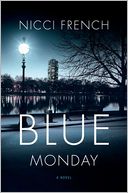“Blue Monday”, according to some very shaky pseudoscience, is the most depressing day of the year.
 Which makes Blue Monday a fitting title for the first book in Nicci French’s new mystery series. Psychotherapist Frieda Klein features as the reader’s guide into the darker recesses into the human mind.
Which makes Blue Monday a fitting title for the first book in Nicci French’s new mystery series. Psychotherapist Frieda Klein features as the reader’s guide into the darker recesses into the human mind.
Frieda’s first “case” delves into dark places, indeed. Because this mystery is a case about lost people. Not just the initial tragedy of a missing child that opens the story, but all of the characters in this multi-act tragedy have lost essential pieces of themselves.
Including the psychotherapists who are supposed to guide their patients out of the depths. And the deeper this case goes, the murkier it gets. But it is enthralling until long after the last page is turned.
It all starts with a lost child. Twenty years ago, Joanna Vine disappeared on her way home from school. Her sister Rose lost track of her for just a couple of minutes, and little Jo vanished. Joanna was five years old. Rose Vine was only nine.
Joanna was never found. Not the child, not her body. Rose never stopped blaming herself for that one moment of childish selfishness.
The Vine’s marriage didn’t survive the tragedy. Richard Vine drank too much. Deborah Vine remarried and tried to move on.
Then a little boy disappeared, under almost identical circumstances, over twenty years later. But serial criminals don’t usually wait that long. Two doesn’t make a serial anything. But there is no other child snatching like these two, not in the long intervening years.
And psychotherapist Frieda Klein has a new patient. A patient who came to her before the boy, Matthew Faraday, was kidnapped. Frieda’s new patient described seeing a little boy just like Matthew waiting for him and imagined a little boy just like Matthew being his son.
Is Frieda’s patient, Alan Dekker, the kidnapper? This time? He’s not Joanna’s snatcher since he was a child then himself. But does he know something?
Frieda’s investigation into Alan Dekker’s lost boy unearths the lost, lonely, abandoned child that Alan Dekker used to be. A child who never knew Joanna Vine then, and doesn’t know anything about Matthew Faraday now.
But Alan’s lost history is the key to everything. If it doesn’t destroy him first.
Escape Rating A: This is a psychological thriller, and it is excellent. It also has one of those endings that twists at the very, very last second in a very neat and creepy/spine-tingling way.
The characters in this drama are fascinating. The story starts out as a tragedy with the lost child. But every single person has lost something important. There is a major theme about the loss of identity, and about adult children with major pieces of their identities missing. But even the supposedly “whole” people have major gaps in their lives and are patching over them as part of the story.
If you enjoy psychological thrillers with darker edges, read this one on a sunny day!







